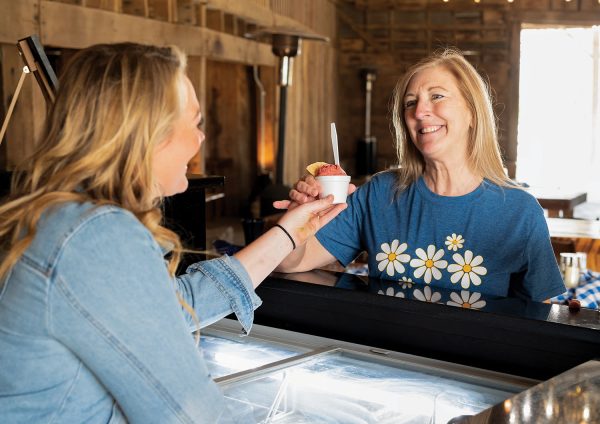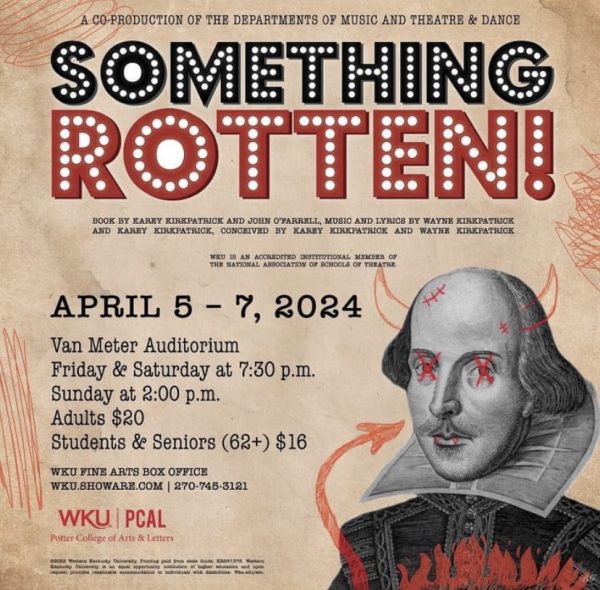Memories of 93-year-old alumna offer image of the true spirit of Western
February 19, 2004
RUSSELLVILLE – A radiant smile spreads over her fair-skinned face as Virginia Brown sits propped in her bed, adorned in a cozy pink sweatshirt. Leg braces sit cradled nearby to aid limbs which were paralyzed during a hip surgery four years ago.
For this reason the 93-year-old Western alumna keeps a bell handy, so she can call for help.
She is immobile now. A white knit blanket drapes the legs that carried her through her journeys in life. She was a trailblazer when the trail for women on the Hill was still riddled with rocks.
“The most remarkable thing about ‘Mee-Maw’ is she’s came through changes that have come along in her lifetime and met everything head on,” her granddaughter Marianne Brown said.
Virginia Brown’s worn skin doesn’t only symbolize her age. Her frail exterior covers the interior spirit of a woman who wants nothing more than to be the vibrant active athlete she once was. Or see the smiles that only a longtime teacher gets to see from her students.
Brown still has reason to smile in the twilight of her life. The lace curtains that hang from a window behind her bed, after all, still offer a view of the land that she was born and raised on – a luxury few can claim.
She adjusts in her perch as she tries so hard to recall fading details of her life, taking time to adjust her glasses as she interlocks her hands in her lap. The story she tells is of a life filled with “adventure and learning.” The story includes reminisces – however small and minute – about the past 70 years.
Brown thinks about life on the Hill and the things she did. She is in many respects a living reminder of a forgotten past of Western.
“I was always into everything that came along,” Brown said. “I wanted to be in everything.
Things have changed
Brown recalls days when she ran up and down the hardwood floors of the old red barn that was once home of Lady Topper basketball.
“The court was good,” she said. “But the rest was no good.”
Legendary Western coach E.A. Diddle recruited Brown through her father from her hometown of Olmstead, Ky., she said.
“Daddy talked to Coach Diddle and he told me to come on up and play basketball,” Brown said.
She experienced the early ‘red towel’ waving days of Diddle first hand.
“He was nice as he could be and he told me I could call on him for everything,” Brown said.
Brown played center for two years, and was part of the program’s first championship team in 1930 when they won the Kentucky Intercollegiate Women’s Championship. Then-coach Elizabeth Dabbs awarded her players with letters and gold basketballs.
“That’s all I wanted to do was play sports,” Brown said.
Nancy Baird, interim department head of the Kentucky Library, researched the women’s basketball team and couldn’t find a concrete reason for what amounted to a nearly 45-year absence from 1930-73.
“Although there was no explanation, it has been found that the school’s decision undoubtedly was based on lack of money and prevailing beliefs concerning the sport’s harmful effects on women.”
Brown’s memories of why the program went on hiatus are even fewer.
“They declared it was too hard for girls,” Brown said.
Baird’s research said the Kentucky High School Athletic Association concluded that basketball “could cause pelvic disorders, menstrual problems, physical strain, appendicitis, tuberculosis and a weakened heart.”
Brown’s team opened doors. From the rigid conditions of a red barn, the Lady Toppers now play in the luxuries of Diddle Arena as they show that women have the ability to excel in sports and are equal to men.
They perform in front of thousands of towel waving fans and prove the importance and perspective of women’s sports has definetly changed.
“My goodness, things have changed.” Brown said.
Dear old Western
Brown sits in her bed flipping through the pages of the 2003-2004 Lady Topper media guide that lays near her bedside with her crossword puzzles.
“I think it’s good the girls are getting recognition,” Brown says, ” I wish we could have gotten a little.”
She looks for Lillie Mason, a legend on the Hill who played in the ’80s.
“I know her family,” she said beaming.
Brown closes the catalog.
Brown worked as a waitress for Western’s football team to help pay for her room and board. She prepared vegetables in the kitchen for spending money.
“For 10 to 15 cents an hour we could walk to the picture show,” Brown said as if ripping it from her memory.
She also worked in the basement of the administrative building as a telephone operator right under the president that many know only as the statue on the Hill – Henry Hardin Cherry.
“He required you to be at chapel every afternoon.” Brown says. “You had to be there. They expected you to be there and if you weren’t there they’d know. I liked chapel.”
Brown recalls that chapel involved speakers presenting speeches and organs playing tunes which the students participated in as a daily worship.
Brown went to Western for three years total and obtained her Lifetime Teachers Certificate with an interest in math.
Changing direction
She married Tom Brown in 1934 after meeting him at the “picture show.” Brown decided to put her degree to use after her marriage.
“After I got married I didn’t play (basketball) anymore. I started having children,” she said.
Brown taught at a small county school in Olmstead. She earned $48 to $50 a month educating grade school students for 15 years.
While teaching she raised four children, Tom Jr., Bradley, George and Jane, and helped manage a farm.
“The greatest gift momma taught us was hard work,” Bradley Brown, her youngest son, said.
Many of her relatives also admire her strength and ability to accept and grow with the changing world.
“She’s got values. Yes, she’s old fashioned, but yet she’s stayed with modern times. She accepts things as time changes,” Tom Brown said.
Virginia Brown said she wanted to change many lives through her own understanding of the importance of education.
A few months ago a student called and thanked her for her teaching that changed his life. He became a preacher.
“Get you an education and do anything you want to do,” she said.
Back in her room
Pictures of her 11 grandchildren, 28 great- grandchildren and one great-great-grandchild decorate her refrigerator. Across the room on her living room wall hangs a picture of her father and her mother.
As she lays in her bed and gazes at the picture of her husband that sits on the dresser, a sadness falls in her eyes.
“This is the worst part of my life,” she said. “I can’t do what I want to do.”
With diabetes, heart problems and paralysis, she is not able to get around as she used to. Her daughter-in-law, Frances Brown, said Virginia Brown is not able to dress herself or do her gardening, which she did until she was 89-years-old.
Her religion is a top priority, she said, so the people in the congregation at nearby Bethany Church of Christ come to her house for Sunday School lessons and communion.
“She’s read the Bible cover to cover twice,” Frances Brown said.
John Oldham played basketball for Western under Diddle in the 1940s and later served as head coach (’64-’71) and athletic director (’71-’86). Like Brown, he also interacted with legendary Western figures. Those relationships give him a unique perspective at age 80.
“(Western) hasn’t changed much except in size,” Oldham said. “I knew the people whose names were on the buildings. I remember the kindness of the faculty. Being 80, you start to go into slow motion and your memories get slower.
“The spirit of Western is still there. Things haven’t changed as much as people think. The spirit is your mind – how you think, what you think and how you like to be treated. Students today won’t remember the big things, it will be the people and friends – the lasting life long relationships.”
That is what Virginia Brown has – a life full of lessons both in the classroom and in her life.
As she struggles through the daily pains and ailments along with her age, she still finds reasons to smile and be thankful for each day she lives. Being able to conquer age and fulfill goals, despite the torments of imperfection, epitomizes that the spirit truly does make the master.
“Her life in general is an inspiration … she’s done it all,” Frances Brown said.
Reach Tavia Green at [email protected]













![Students cheer for Senator at Large Jaden Marshall after being announced as the Intercultural Student Engagement Center Senator for the 24th Senate on Wednesday, April 17 in the Senate Chamber in DSU. Ive done everything in my power, Ive said it 100 times, to be for the students, Marshall said. So, not only to win, but to hear that reaction for me by the other students is just something that shows people actually care about me [and] really support me.](https://wkuherald.com/wp-content/uploads/2024/04/jadenmarshall-1200x844.jpg)




![Megan Inman of Tennessee cries after embracing Drag performer and transgender advocate Jasmine St. James at the 9th Annual WKU Housing and Residence Life Drag Show at Knicely Conference Center on April 4, 2024. “[The community] was so warm and welcoming when I came out, if it wasn’t for the queens I wouldn’t be here,” Inman said.](https://wkuherald.com/wp-content/uploads/2024/04/smith_von_drag_3-600x419.jpg)






